Latest Sheet Music
John Williams

John Towner Williams (born February 8, 1932) is an American composer, conductor, and pianist. In a career that spans six decades, Williams has composed many of the most famous film scores in Hollywood history, including Star Wars, Superman, Home Alone, the first three Harry Potter movies and all but two of Steven Spielberg's feature films including the Indiana Jones series, Schindler's List, E.T. the Extra-Terrestrial, Jurassic Park and Jaws. He also composed the soundtrack for the hit 1960s television series Lost in Space as well as the fanfare of the DreamWorks Pictures' logo.
Williams has composed theme music for four Olympic Games, the NBC Nightly News, the rededication of the Statue of Liberty, and numerous television series and concert pieces. He served as the principal conductor of the Boston Pops Orchestra from 1980 to 1993, and is now the orchestra's laureate conductor.
Williams is a five-time winner of the Academy Award. He has also won four Golden Globe Awards, seven BAFTA Awards and 21 Grammy Awards. With 45 Academy Award nominations, Williams is, together with composer Alfred Newman, the second most nominated person after Walt Disney. He was inducted into the Hollywood Bowl Hall of Fame in 2000, and was a recipient of the Kennedy Center Honors in 2004.
Williams has composed theme music for four Olympic Games, the NBC Nightly News, the rededication of the Statue of Liberty, and numerous television series and concert pieces. He served as the principal conductor of the Boston Pops Orchestra from 1980 to 1993, and is now the orchestra's laureate conductor.
Williams is a five-time winner of the Academy Award. He has also won four Golden Globe Awards, seven BAFTA Awards and 21 Grammy Awards. With 45 Academy Award nominations, Williams is, together with composer Alfred Newman, the second most nominated person after Walt Disney. He was inducted into the Hollywood Bowl Hall of Fame in 2000, and was a recipient of the Kennedy Center Honors in 2004.
Jaco Pastorius

John Francis Anthony "Jaco" Pastorius III was an American jazz bassist who was a member of Weather Report from 1976 to 1981. He worked with Pat Metheny and Joni Mitchell, and recorded albums as a solo artist and band leader. His bass playing employed funk, lyrical solos, bass chords, and innovative harmonics.
Bruno Mars

Peter Gene Hernandez (born October 8, 1985), better known by his stage name Bruno Mars, is an American singer-songwriter and music producer. Raised in Honolulu, Hawaii by a family of musicians, Mars began making music at a young age. After performing in various musical venues in his hometown throughout his childhood, he decided to pursue a musical career. Mars began producing songs for other artists, joining production team The Smeezingtons.
He became recognized as a solo artist after lending his vocals and co-writing the hooks for the songs "Nothin' on You" by B.o.B, and "Billionaire" by Travie McCoy. He also co-wrote the hits "Right Round" by Flo Rida featuring Kesha, "Wavin' Flag" by K'naan, and "Fuck You!" by Cee Lo Green. In October 2010, he released his debut album, Doo-Wops & Hooligans. Anchored by the singles "Just the Way You Are" and "Grenade", the album peaked at number three on the Billboard 200. He has been nominated for seven Grammys at the 53rd Grammy Awards, which will be held on February 13, 2011.
He became recognized as a solo artist after lending his vocals and co-writing the hooks for the songs "Nothin' on You" by B.o.B, and "Billionaire" by Travie McCoy. He also co-wrote the hits "Right Round" by Flo Rida featuring Kesha, "Wavin' Flag" by K'naan, and "Fuck You!" by Cee Lo Green. In October 2010, he released his debut album, Doo-Wops & Hooligans. Anchored by the singles "Just the Way You Are" and "Grenade", the album peaked at number three on the Billboard 200. He has been nominated for seven Grammys at the 53rd Grammy Awards, which will be held on February 13, 2011.
Brahms

Johannes Brahms (May 7, 1833 â April 3, 1897) was a German composer of the Romantic period. He was born in Hamburg and in his later years he settled in Vienna, Austria.
Brahms maintained a Classical sense of form and order in his works â in contrast to the opulence of the music of many of his contemporaries. Thus many admirers (though not necessarily Brahms himself) saw him as the champion of traditional forms and "pure music," as opposed to the New German embrace of program music.
Brahms venerated Beethoven: in the composer's home, a marble bust of Beethoven looked down on the spot where he composed, and some passages in his works are reminiscent of Beethoven's style. The main theme of the finale of Brahms's First Symphony is reminiscent of the main theme of the finale of Beethoven's Ninth, and when this resemblance was pointed out to Brahms he replied that any ass â jeder Esel â could see that.
Ein deutsches Requiem was partially inspired by his mother's death in 1865, but also incorporates material from a Symphony he started in 1854, but abandoned following Schumann's suicide attempt. He once wrote that the Requiem "belonged to Schumann". The first movement of this abandoned Symphony was re-worked as the first movement of the First Piano Concerto.
Brahms also loved the Classical composers Mozart and Haydn. He collected first editions and autographs of their works, and edited performing editions. He also studied the music of pre-classical composers, including Giovanni Gabrieli, Johann Adolph Hasse, Heinrich Schütz and especially Johann Sebastian Bach. His friends included leading musicologists, and with Friedrich Chrysander he edited an edition of the works of François Couperin. He looked to older music for inspiration in the arts of strict counterpoint; the themes of some of his works are modelled on Baroque sources, such as Bach's The Art of Fugue in the fugal finale of Cello Sonata No. 1, or the same composer's Cantata No. 150 in the passacaglia theme of the Fourth Symphony's finale.
Brahms maintained a Classical sense of form and order in his works â in contrast to the opulence of the music of many of his contemporaries. Thus many admirers (though not necessarily Brahms himself) saw him as the champion of traditional forms and "pure music," as opposed to the New German embrace of program music.
Brahms venerated Beethoven: in the composer's home, a marble bust of Beethoven looked down on the spot where he composed, and some passages in his works are reminiscent of Beethoven's style. The main theme of the finale of Brahms's First Symphony is reminiscent of the main theme of the finale of Beethoven's Ninth, and when this resemblance was pointed out to Brahms he replied that any ass â jeder Esel â could see that.
Ein deutsches Requiem was partially inspired by his mother's death in 1865, but also incorporates material from a Symphony he started in 1854, but abandoned following Schumann's suicide attempt. He once wrote that the Requiem "belonged to Schumann". The first movement of this abandoned Symphony was re-worked as the first movement of the First Piano Concerto.
Brahms also loved the Classical composers Mozart and Haydn. He collected first editions and autographs of their works, and edited performing editions. He also studied the music of pre-classical composers, including Giovanni Gabrieli, Johann Adolph Hasse, Heinrich Schütz and especially Johann Sebastian Bach. His friends included leading musicologists, and with Friedrich Chrysander he edited an edition of the works of François Couperin. He looked to older music for inspiration in the arts of strict counterpoint; the themes of some of his works are modelled on Baroque sources, such as Bach's The Art of Fugue in the fugal finale of Cello Sonata No. 1, or the same composer's Cantata No. 150 in the passacaglia theme of the Fourth Symphony's finale.
Chopin

Frédéric Chopin (1 March 1810 – 17 October 1849) was a Polish composer and virtuoso pianist of the Romantic period. He is widely regarded as the greatest Polish composer, and ranks as one of music's greatest tone poets.
He was born in the village of Żelazowa Wola, in the Duchy of Warsaw, to a Polish mother and French-expatriate father, and in his early life was regarded as a child-prodigy pianist. In November 1830, at the age of 20, Chopin went abroad; following the suppression of the Polish November Uprising of 1830–31, he became one of many expatriates of the Polish "Great Emigration."
In Paris, he made a comfortable living as a composer and piano teacher, while giving few public performances. A Polish patriot,
Chopin's extant compositions were written primarily for the piano as a solo instrument. Though technically demanding, Chopin's style emphasizes nuance and expressive depth rather than virtuosity. Chopin invented musical forms such as the ballade and was responsible for major innovations in forms such as the piano sonata, waltz, nocturne, étude, impromptu and prelude. His works are mainstays of Romanticism in 19th-century classical music.
He was born in the village of Żelazowa Wola, in the Duchy of Warsaw, to a Polish mother and French-expatriate father, and in his early life was regarded as a child-prodigy pianist. In November 1830, at the age of 20, Chopin went abroad; following the suppression of the Polish November Uprising of 1830–31, he became one of many expatriates of the Polish "Great Emigration."
In Paris, he made a comfortable living as a composer and piano teacher, while giving few public performances. A Polish patriot,
Chopin's extant compositions were written primarily for the piano as a solo instrument. Though technically demanding, Chopin's style emphasizes nuance and expressive depth rather than virtuosity. Chopin invented musical forms such as the ballade and was responsible for major innovations in forms such as the piano sonata, waltz, nocturne, étude, impromptu and prelude. His works are mainstays of Romanticism in 19th-century classical music.
W.A. Mozart

Wolfgang Amadeus Mozart (German: , full baptismal name Johannes Chrysostomus Wolfgangus Theophilus Mozart (27 January 1756 – 5 December 1791), was a prolific and influential composer of the Classical era. He composed over 600 works, many acknowledged as pinnacles of symphonic, concertante, chamber, piano, operatic, and choral music. He is among the most enduringly popular of classical composers.
Mozart showed prodigious ability from his earliest childhood in Salzburg. Already competent on keyboard and violin, he composed from the age of five and performed before European royalty; at 17 he was engaged as a court musician in Salzburg, but grew restless and traveled in search of a better position, always composing abundantly. While visiting Vienna in 1781, he was dismissed from his Salzburg position. He chose to stay in the capital, where he achieved fame but little financial security. During his final years in Vienna, he composed many of his best-known symphonies, concertos, and operas, and the Requiem. The circumstances of his early death have been much mythologized. He was survived by his wife Constanze and two sons.
Mozart learned voraciously from others, and developed a brilliance and maturity of style that encompassed the light and graceful along with the dark and passionate—the whole informed by a vision of humanity "redeemed through art, forgiven, and reconciled with nature and the absolute." His influence on subsequent Western art music is profound. Beethoven wrote his own early compositions in the shadow of Mozart, of whom Joseph Haydn wrote that "posterity will not see such a talent again in 100 years."
Mozart showed prodigious ability from his earliest childhood in Salzburg. Already competent on keyboard and violin, he composed from the age of five and performed before European royalty; at 17 he was engaged as a court musician in Salzburg, but grew restless and traveled in search of a better position, always composing abundantly. While visiting Vienna in 1781, he was dismissed from his Salzburg position. He chose to stay in the capital, where he achieved fame but little financial security. During his final years in Vienna, he composed many of his best-known symphonies, concertos, and operas, and the Requiem. The circumstances of his early death have been much mythologized. He was survived by his wife Constanze and two sons.
Mozart learned voraciously from others, and developed a brilliance and maturity of style that encompassed the light and graceful along with the dark and passionate—the whole informed by a vision of humanity "redeemed through art, forgiven, and reconciled with nature and the absolute." His influence on subsequent Western art music is profound. Beethoven wrote his own early compositions in the shadow of Mozart, of whom Joseph Haydn wrote that "posterity will not see such a talent again in 100 years."
Final Fantasy
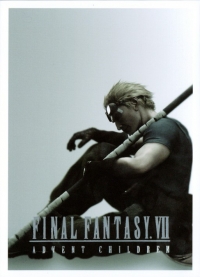
Final Fantasy (ファイナルファンタジー?) is a media franchise created by Hironobu Sakaguchi, and is developed and owned by Square Enix (formerly Squaresoft). The franchise centers on a series of fantasy and science-fantasy console role-playing games (RPGs), but includes motion pictures, anime, printed media, and other merchandise. The series began in 1987 as an eponymous video game developed to save Square from bankruptcy; the game was a success and spawned sequels. The video game series has since branched into other genres such as tactical role-playing, action role-playing, massively multiplayer online role-playing, and racing.
Although most Final Fantasy installments are independent stories with various different settings and main characters, they feature common elements that define the franchise. Such recurring elements include plot themes, character names, and game mechanics. Plots center on a group of heroes battling a great evil while exploring the characters' internal struggles and relationships. Character names are often derived from the history, languages, and mythologies of cultures worldwide.
The series has been commercially and critically successful; it is Square Enix's best selling video game franchise, with more than 85 million units sold, and one of the best-selling video game franchises. It was awarded a star on the Walk of Game in 2006, and holds seven Guinness World Records in the Guinness World Records Gamer's Edition 2008. The series is well known for its innovation, visuals, and music, such as the inclusion of full motion videos, photo-realistic character models, and orchestrated music by Nobuo Uematsu. Final Fantasy has been a driving force in the video game industry. The video game series has affected Square's business practices and its relationships with other video game developers. It has also introduced many features now common in console RPGs and has been credited with helping to popularize RPGs in markets outside Japan.
Although most Final Fantasy installments are independent stories with various different settings and main characters, they feature common elements that define the franchise. Such recurring elements include plot themes, character names, and game mechanics. Plots center on a group of heroes battling a great evil while exploring the characters' internal struggles and relationships. Character names are often derived from the history, languages, and mythologies of cultures worldwide.
The series has been commercially and critically successful; it is Square Enix's best selling video game franchise, with more than 85 million units sold, and one of the best-selling video game franchises. It was awarded a star on the Walk of Game in 2006, and holds seven Guinness World Records in the Guinness World Records Gamer's Edition 2008. The series is well known for its innovation, visuals, and music, such as the inclusion of full motion videos, photo-realistic character models, and orchestrated music by Nobuo Uematsu. Final Fantasy has been a driving force in the video game industry. The video game series has affected Square's business practices and its relationships with other video game developers. It has also introduced many features now common in console RPGs and has been credited with helping to popularize RPGs in markets outside Japan.
Rachmaninoff

Sergei Vasilievich Rachmaninoff (1 April 1873 - 28 March 1943) was a Russian composer, pianist, and conductor. He was one of the finest pianists of his day and, as a composer, the last great representative of Russian late Romanticism in classical music. Early influences of Tchaikovsky, Rimsky-Korsakov and other Russian composers gave way to a thoroughly personal idiom which included a pronounced lyricism, expressive breadth, structural ingenuity and a tonal palette of rich, distinctive orchestral colors.
Understandably, the piano figures prominently in Rachmaninoff's compositional output, either as a solo instrument or as part of an ensemble. He made it a point, however, to use his own skills as a performer to explore fully the expressive possibilities of the instrument. Even in his earliest works, he revealed a sure grasp of idiomatic piano writing and a striking gift for melody. In some of his early orchestral pieces he showed the first signs of a talent for tone painting, which he would perfect in The Isle of the Dead, and he began to show a similar penchant for vocal writing in two early sets of songs, Opp. 4 and 8. Rachmaninoff's masterpiece, however, is his choral symphony The Bells, in which all of his talents are fused and unified.
Rachmaninoff sometimes felt threatened by the success of modernists such as Scriabin and Prokofiev and wondered whether to cease composing even before he left Russia. His musical philosophy was rooted in the Russian spiritual tradition, where the role of the artist was to create beauty and to speak the truth from the depths of his heart. In his last major interview, in 1941, he admitted his music, like Russian music, was a product of his temperament. He said, on another occasion, "The new kind of music seems to create not from the heart but from the head. Its composers think rather than feel. They have not the capacity to make their works exalt—they meditate, protest, analyze, reason, calculate and brood, but they do not exalt."
Understandably, the piano figures prominently in Rachmaninoff's compositional output, either as a solo instrument or as part of an ensemble. He made it a point, however, to use his own skills as a performer to explore fully the expressive possibilities of the instrument. Even in his earliest works, he revealed a sure grasp of idiomatic piano writing and a striking gift for melody. In some of his early orchestral pieces he showed the first signs of a talent for tone painting, which he would perfect in The Isle of the Dead, and he began to show a similar penchant for vocal writing in two early sets of songs, Opp. 4 and 8. Rachmaninoff's masterpiece, however, is his choral symphony The Bells, in which all of his talents are fused and unified.
Rachmaninoff sometimes felt threatened by the success of modernists such as Scriabin and Prokofiev and wondered whether to cease composing even before he left Russia. His musical philosophy was rooted in the Russian spiritual tradition, where the role of the artist was to create beauty and to speak the truth from the depths of his heart. In his last major interview, in 1941, he admitted his music, like Russian music, was a product of his temperament. He said, on another occasion, "The new kind of music seems to create not from the heart but from the head. Its composers think rather than feel. They have not the capacity to make their works exalt—they meditate, protest, analyze, reason, calculate and brood, but they do not exalt."
Théodore-César Salom
Théodore-César Salomé (20 January 1834 – 26 July 1896) was a French organist and composer.Théodore Salomé was born in Paris. He completed all of his musical studies at the Conservatoire de Paris, under the tutelage of François Bazin for harmony and accompaniment, and François Benoist for organ. He won several honorable awards, including: second prize in harmony (1855), second prize in organ and in harmony (1856), second and third prize in harmony and organ (1857), and second prize in harmony (1859). His cantata Atala was awarded the premier Second Grand Prix of the Prix de Rome in 1861. In the same year Théodore Dubois was awarded the first grand prize, and Eugène Anthiome and Titus Constantin won the deuxième Second Grand Prix.
Paolo Tosti
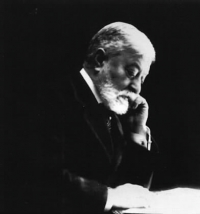
Sir Paolo Tosti (April 9, 1846 – December 2, 1916) was an Italian, later British, composer and music teacher.
Tosti's songs are characterized by natural, singable melodies and sweet sentimentality. He is also known for his editions of Italian folk songs entitled "Canti popoliari Abruzzesi". Tosti is remembered for his light, expressive songs. His style became very popular during the Belle Époque and is often known as salon music. His most famous works are Serenata (lyrics: Cesareo), Goodbye (lyrics: George J. Whyte Mellville) which is sometimes performed in Italian as Addio (lyrics: Rizzelli), and the popular Neapolitan song, Marechiare, the lyrics of which are by the prominent Neapolitan dialect poet, Salvatore Di Giacomo.
As a composer, Tosti is exceptional. Since the beginning of the recording era, numerous recording artists specializing in classical Italian repertoire have recorded Tosti songs, yet Tosti never composed opera. Notable examples on recording include Alessandro Moreschi (the only castrato who ever recorded) singing "Ideale", Nellie Melba singing "Mattinata" and Jussi Björling singing "L'alba separa dalla luce l'ombra".
Tosti's songs are characterized by natural, singable melodies and sweet sentimentality. He is also known for his editions of Italian folk songs entitled "Canti popoliari Abruzzesi". Tosti is remembered for his light, expressive songs. His style became very popular during the Belle Époque and is often known as salon music. His most famous works are Serenata (lyrics: Cesareo), Goodbye (lyrics: George J. Whyte Mellville) which is sometimes performed in Italian as Addio (lyrics: Rizzelli), and the popular Neapolitan song, Marechiare, the lyrics of which are by the prominent Neapolitan dialect poet, Salvatore Di Giacomo.
As a composer, Tosti is exceptional. Since the beginning of the recording era, numerous recording artists specializing in classical Italian repertoire have recorded Tosti songs, yet Tosti never composed opera. Notable examples on recording include Alessandro Moreschi (the only castrato who ever recorded) singing "Ideale", Nellie Melba singing "Mattinata" and Jussi Björling singing "L'alba separa dalla luce l'ombra".
Ravel

Joseph-Maurice Ravel (March 7, 1875 – December 28, 1937) was a French composer of Impressionist music known especially for his melodies, orchestral and instrumental textures and effects. Much of his piano music, chamber music, vocal music and orchestral music has entered the standard concert repertoire.
Ravel's piano compositions, such as Jeux d'eau, Miroirs and Gaspard de la Nuit, demand considerable virtuosity from the performer, and his orchestral music, including Daphnis et Chloé and his arrangement of Modest Mussorgsky's Pictures at an Exhibition, uses a variety of sound and instrumentation very effectively.
Ravel is perhaps known best for his orchestral work, Boléro (1928), which he considered trivial and once described as "a piece for orchestra without music."
According to SACEM, Ravel's estate earns more royalties than that of any other French musician. According to international copyright law, Ravel's works are public domain since January 1, 2008 in most countries. In France, due to anomalous copyright law extensions to account for the two world wars, they will not enter the public domain until 2015.
Ravel's piano compositions, such as Jeux d'eau, Miroirs and Gaspard de la Nuit, demand considerable virtuosity from the performer, and his orchestral music, including Daphnis et Chloé and his arrangement of Modest Mussorgsky's Pictures at an Exhibition, uses a variety of sound and instrumentation very effectively.
Ravel is perhaps known best for his orchestral work, Boléro (1928), which he considered trivial and once described as "a piece for orchestra without music."
According to SACEM, Ravel's estate earns more royalties than that of any other French musician. According to international copyright law, Ravel's works are public domain since January 1, 2008 in most countries. In France, due to anomalous copyright law extensions to account for the two world wars, they will not enter the public domain until 2015.
Ouran High School Host Club

Ouran High School Host Club (桜蘭高校ホスト部 Ōran Kōkō Hosuto Kurabu?) is a manga series by Bisco Hatori, serialized in Hakusensha's LaLa magazine since August 5, 2003. The series follows Haruhi Fujioka, a scholarship student at Ouran High School, and the other members of the popular host club. The romantic comedy focuses on the relationships within and without the Club and satirizes the clichés and stereotypes that endure in shōjo. There are also occasional moments where the characters break the fourth wall. The manga has been adapted into a series of audio dramas, an animated television series directed by Takuya Igarashi and produced by Bones, and a visual novel by Idea Factory.
Evanescence

Evanescence is an American rock band founded in Little Rock, Arkansas in 1995 by singer/pianist Amy Lee and guitarist Ben Moody.
After recording two private EPs and a demo CD named Origin, with the help of Bigwig Enterprises in 2000, the band released their first full-length album, Fallen, on Wind-up Records in 2003. Fallen sold more than 15 million copies worldwide and helped the band win two Grammy Awards. A year later, Evanescence released their first live album, Anywhere but Home, which sold more than one million copies worldwide. In 2006, the band released their second studio album, The Open Door, which has sold more than four million copies.
The band has suffered several line-up changes, including co-founder Moody leaving in 2003, followed by guitarist John LeCompt and drummer Rocky Gray in 2007. Lee is now the only original member of Evanescence remaining in the band.
After recording two private EPs and a demo CD named Origin, with the help of Bigwig Enterprises in 2000, the band released their first full-length album, Fallen, on Wind-up Records in 2003. Fallen sold more than 15 million copies worldwide and helped the band win two Grammy Awards. A year later, Evanescence released their first live album, Anywhere but Home, which sold more than one million copies worldwide. In 2006, the band released their second studio album, The Open Door, which has sold more than four million copies.
The band has suffered several line-up changes, including co-founder Moody leaving in 2003, followed by guitarist John LeCompt and drummer Rocky Gray in 2007. Lee is now the only original member of Evanescence remaining in the band.
The Cadets Drum and Bugle Corps

The Cadets Drum and Bugle Corps (formerly the Holy Name Cadets, Cadets of Garfield, Garfield Cadets, and Cadets of Bergen County) is a World Class competitive junior drum and bugle corps. Based in Allentown, Pennsylvania, The Cadets was one of the thirteen founding corps of Drum Corps International (DCI), is a ten-time DCI World Champion, and is the oldest continuously active junior drum and bugle corps in North America.
K-Ci
K-Ci & JoJo is an American R&B duo, consisting of brothers Cedric "K-Ci" Hailey (born September 2, 1969) and Joel "JoJo" Hailey (born June 10, 1971). Natives of Monroe, North Carolina, they are also the lead singers of the chart-topping R&B group Jodeci with the DeGrate brothers—Donald (better known as DeVante Swing) and Mr. Dalvin.
Charles Aznavour
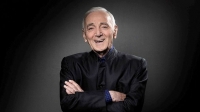
Charles Aznavour Singer-songwriter Charles Aznavour is an Armenian singer, songwriter, actor and diplomat. Wikipedia
Date of birth: May 22, 1924, Saint-Germain-des-Prés, Paris, France Date and place of death: 1 October 2018, Mouriès, France
Date of birth: May 22, 1924, Saint-Germain-des-Prés, Paris, France Date and place of death: 1 October 2018, Mouriès, France
John Legend

John Stephens (born December 28, 1978) better known by his stage name John Legend, is an American soul singer, songwriter, and pianist. His debut studio album, the multiplatinum-selling Get Lifted, was released in late 2004, and features collaborations with rapper and producer Kanye West as well as Snoop Dogg. Get Lifted produced two singles: "Used to Love U" (US top 100, UK top 30) and "Ordinary People" (US and UK top 30). Legend has won five Grammy Awards. Prior to the release of his debut album, Legend's career gained momentum through a series of successful collaborations with multiple established artists. Notably, Legend sang the hooks for hits by Slum Village ("Selfish", also featuring Kanye West), Jay-Z ("Encore"), and Dilated Peoples ("This Way", also featuring Kanye West); played piano on Lauryn Hill's "Everything is Everything"; and sang background vocals on Alicia Keys' "You Don't Know My Name" and Fort Minor's "High Road."
Jeanine Tesori
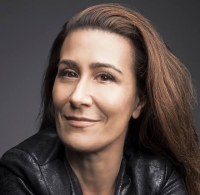
Jeanine Tesori is an American composer and musical arranger. She is the most prolific and honored female theatrical composer in history, with five Broadway musicals and five Tony Award nominations.
Beaver Felton

It's almost impossible to talk about educational systems for the electric bass without addressing the Superchops 4 Bass method by Beaver Felton. Endorsements from such notables as Will Lee and Victor Wooten, a string of great reviews from major music magazines, and an incredible word-of-mouth reputation have made Superchops one of the most popular audio and video instructional series on the market today.
Patsy Cline
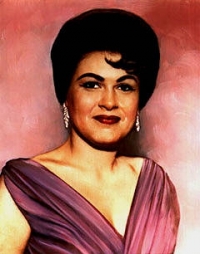
Patsy Cline (September 8, 1932–March 5, 1963), born Virginia Patterson Hensley, was an American country music singer who enjoyed pop music crossover success during the era of the Nashville sound in the early 1960s. Since her death at age 30 in a 1963 private airplane crash at the height of her career, she has been considered one of the most influential, successful and acclaimed female vocalists of the 20th century.
Cline was best known for her rich tone and emotionally expressive bold contralto voice, which, along with her role as a mover and shaker in the country music industry, has been cited as an inspiration by many vocalists of various music genres. Her life and career have been the subject of numerous books, movies, documentaries, articles and stage plays.
Her hits included "Walkin' After Midnight", "I Fall to Pieces", "She's Got You", "Crazy" and "Sweet Dreams". Posthumously, millions of her albums have been sold over the past 46 years and she has been given numerous awards, which have given her an iconic status with some fans similar to that of legends Johnny Cash and Elvis Presley. Ten years after her death, she became the first female solo artist inducted to the Country Music Hall of Fame.
In 2002, Cline was voted by artists and members of the country music industry as number one on CMT's television special, The 40 Greatest Women of Country Music, and in 1999 she was voted number 11 on VH1's special The 100 Greatest Women in Rock and Roll by members and artists of the rock industry. According to her 1973 Country Music Hall of Fame plaque, "Her heritage of timeless recordings is testimony to her artistic capacity."
Cline was best known for her rich tone and emotionally expressive bold contralto voice, which, along with her role as a mover and shaker in the country music industry, has been cited as an inspiration by many vocalists of various music genres. Her life and career have been the subject of numerous books, movies, documentaries, articles and stage plays.
Her hits included "Walkin' After Midnight", "I Fall to Pieces", "She's Got You", "Crazy" and "Sweet Dreams". Posthumously, millions of her albums have been sold over the past 46 years and she has been given numerous awards, which have given her an iconic status with some fans similar to that of legends Johnny Cash and Elvis Presley. Ten years after her death, she became the first female solo artist inducted to the Country Music Hall of Fame.
In 2002, Cline was voted by artists and members of the country music industry as number one on CMT's television special, The 40 Greatest Women of Country Music, and in 1999 she was voted number 11 on VH1's special The 100 Greatest Women in Rock and Roll by members and artists of the rock industry. According to her 1973 Country Music Hall of Fame plaque, "Her heritage of timeless recordings is testimony to her artistic capacity."
Louis Couperin
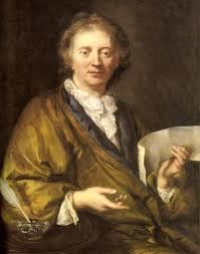
Louis Couperin (French: ; c. 1626 – 29 August 1661) was a French Baroque composer and performer. He was born in Chaumes-en-Brie and moved to Paris in 1650–1651 with the help of Jacques Champion de Chambonnières. Couperin worked as organist of the Church of St. Gervais in Paris and as musician at the court. He quickly became one of the most prominent Parisian musicians, establishing himself as a harpsichordist, organist, and violist, but his career was cut short by his early death at the age of thirty-five.
Vocaloid

Vocaloid (ボーカロイド, Bōkaroido) is a singing voice synthesizer software product. Its signal processing part was developed through a joint research project led by Kenmochi Hideki at the Pompeu Fabra University in Barcelona, Spain, in 2000 and was not originally intended to be a full commercial project. Backed by the Yamaha Corporation, it developed the software into the commercial product "Vocaloid" that was released in 2004.
Brad Wilson
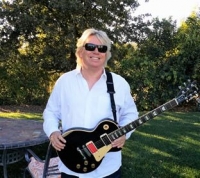
Brad Wilson is a California guitarslinger who plays rocked-up blues and is a charismatic and talented guitarist, vocalist and songwriter. Performing over 100 shows a year, Brad has become known as a smokin' hot Blues player who can rock the house all night long with the best of them.
Jazz Standard
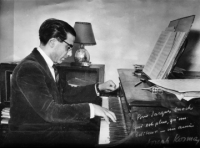
Autumn Leaves" is a popular song and jazz standard composed by Joseph Kosma with original lyrics by Jacques Prévert in French, and later by Johnny Mercer in English. An instrumental version by pianist Roger Williams was a #1 best-seller in the USA Billboard charts of 1955.
Roger Cook
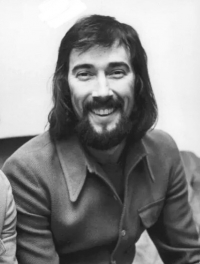
Roger Frederick Cook is an English singer, songwriter and record producer, who has written many hit records for other recording artists. He has also had a successful recording career in his own right. He is best known for his collaborations with Roger Greenaway.
Alejandro García Caturla
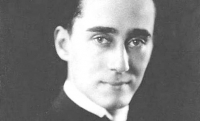
Alejandro García Caturla (7 March 1906 – 12 November 1940) was a Cuban composer of art music and creolized Cuban themes.Caturla was born in the town Remedios (Villa Clara, Cuba). With only sixteen years old, in 1922, he won a position as part of the section of the 2nd violins of the newly formed “Orquesta Sinfónica de La Habana”, where Amadeo Roldán was the concertmaster. He started to write music since he was a teenager, while studying both music and law. He felt attracted to Afro-Cuban rhythms since he was really young, and this became a common denominator in his compositions in a time when the division between art music and popular music did not influence Cuban composers. From 1925 to 1927 he continued his musical studies in Paris as a student of Nadia Boulanger.
Amelie Poulain
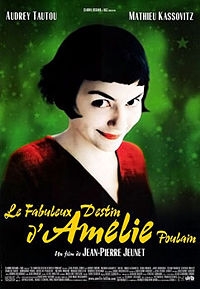
Amélie is a 2001 French film directed by Jean-Pierre Jeunet and starring Audrey Tautou. Its original French title is Le Fabuleux Destin d'Amélie Poulain ("The Fabulous Destiny of Amélie Poulain"; poulain is French for foal). Written by Jeunet with Guillaume Laurant, the film is a whimsical and somewhat idealised depiction of contemporary Parisian life, set in Montmartre. It tells the story of a shy waitress who decides to change the lives of those around her for the better, while struggling with her own isolation.
Amélie won best film at the European Film Awards; it won four César Awards (including Best Film and Best Director), two BAFTA Awards (including Best Original Screenplay), and was nominated for five Academy Awards.
Amélie won best film at the European Film Awards; it won four César Awards (including Best Film and Best Director), two BAFTA Awards (including Best Original Screenplay), and was nominated for five Academy Awards.
Monteverdi

Claudio Giovanni Antonio Monteverdi (May 15, 1567 (baptized) â November 29, 1643), was an Italian composer, gambist, and singer.
Monteverdi's work, often regarded as revolutionary, marked the transition from the music of the Renaissance to that of the Baroque. Enjoying fame in his lifetime, he wrote one of the earliest operas, L'Orfeo, which is still regularly performed.
Monteverdi composed at least eighteen operas, but only L'Orfeo, L'incoronazione di Poppea, Il ritorno d'Ulisse in patria and the famous aria, Lamento, from his second opera L'Arianna have survived. From monody (with melodic lines, intelligible text and placid accompanying music), it was a logical step for Monteverdi to begin composing opera, especially for a dramatically inclined composer who loved grand effect. In 1607, the premiere of his first opera, L'Orfeo, took place in Mantua. It was normal at that time for composers to create works on demand for special occasions, and this piece was part of the ducal celebrations of carnival. (Monteverdi was later to write for the first opera houses supported by ticket sales which opened in Venice). L'Orfeo has dramatic power and lively orchestration and is arguably the first example of a composer assigning specific instruments to parts in operas. It is also one of the first large compositions in which the exact instrumentation of the premiere has come down to us.
Monteverdi's work, often regarded as revolutionary, marked the transition from the music of the Renaissance to that of the Baroque. Enjoying fame in his lifetime, he wrote one of the earliest operas, L'Orfeo, which is still regularly performed.
Monteverdi composed at least eighteen operas, but only L'Orfeo, L'incoronazione di Poppea, Il ritorno d'Ulisse in patria and the famous aria, Lamento, from his second opera L'Arianna have survived. From monody (with melodic lines, intelligible text and placid accompanying music), it was a logical step for Monteverdi to begin composing opera, especially for a dramatically inclined composer who loved grand effect. In 1607, the premiere of his first opera, L'Orfeo, took place in Mantua. It was normal at that time for composers to create works on demand for special occasions, and this piece was part of the ducal celebrations of carnival. (Monteverdi was later to write for the first opera houses supported by ticket sales which opened in Venice). L'Orfeo has dramatic power and lively orchestration and is arguably the first example of a composer assigning specific instruments to parts in operas. It is also one of the first large compositions in which the exact instrumentation of the premiere has come down to us.
Jonathan Larson
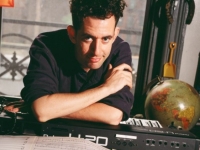
Jonathan David Larson (February 4, 1960 – January 25, 1996) was an American composer and playwright noted for exploring the social issues of multiculturalism, addiction, and homophobia in his work. Typical examples of his use of these themes are found in his works Rent and Tick, Tick... Boom! He received three posthumous Tony Awards and a posthumous Pulitzer Prize for Drama for the rock musical Rent.
Jimmy Van Heusen
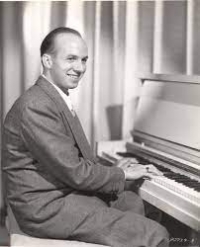
James Van Heusen (born Edward Chester Babcock; January 26, 1913 – February 6, 1990) was an American composer. He wrote songs for films, television and theater, and won an Emmy and four Academy Awards for Best Original Song.Born in Syracuse, New York, Van Heusen began writing music while at high school. He renamed himself at age 16, after the shirt makers Phillips-Van Heusen, to use as his on-air name during local shows. His close friends called him "Chet". Jimmy was raised Methodist.
Harry Warren
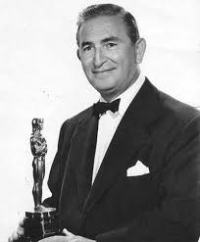
Harry Warren (born Salvatore Antonio Guaragna, December 24, 1893 – September 22, 1981) was an American composer and lyricist. Warren was the first major American songwriter to write primarily for film. He was nominated for the Academy Award for Best Original Song eleven times and won three Oscars for composing "Lullaby of Broadway", "You'll Never Know" and "On the Atchison, Topeka and the Santa Fe". He wrote the music for the first blockbuster film musical, 42nd Street, choreographed by Busby Berkeley, with whom he would collaborate on many musical films.
Joseph Sabolick
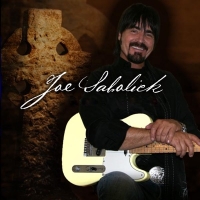
Joe Sabolick Musical artist Songs Reign Reign · 201 It's a New Day It's a New Day · 2014 I'm Dreaming of a White Christmas I'm Dreaming of a White Christmas
Clemen Carl De Guzman
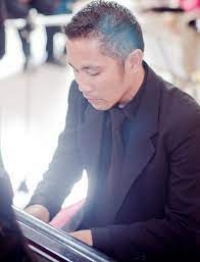
Born in Koronadal, South Cotabato and now residing in Pagadian City, Philippines; working at Pagadian
Montessori Center as Music Director; piano-voice, Music instructor; & director-accompanist for church
choirs. He has several works ranging from classical to contemporary arrangements, songs for church and
school hymns, popular songs and piano selections for students.
Montessori Center as Music Director; piano-voice, Music instructor; & director-accompanist for church
choirs. He has several works ranging from classical to contemporary arrangements, songs for church and
school hymns, popular songs and piano selections for students.
Gordon Young
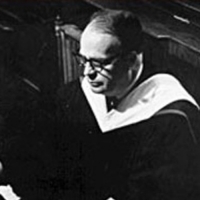
Gordon Young (October 15, 1919 – October 2, 1998) was an American organist and composer of both organ and choral works.Gordon Young was born in McPherson, Kansas on October 15, 1919. He earned a bachelor's degree in music at Southwestern College, Winfield. He then began studying organ with Alexander McCurdy at the Curtis Institute of Music, Philadelphia.Mann, Robert C. (31 October 2018). "Choral Music of Gordon Young Used as Introits". Church Music Institute. Retrieved 15 June 2020.
Da Capo

Da Capo DJ Born: August 14, 1992 (age 29 years) Songs Umbovukazi Hyenah presents RISE RADAR 01 · 2019 Found You Indigo Child · 2017 Mama Mama (Da Capo's Touch) · 2021.
Sweeney Todd: The Demon Barber of Fleet Street
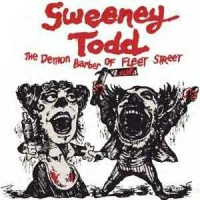
Sweeney Todd, the Demon Barber of Fleet Street: A Musical Thriller is a Tony Award-winning musical with a book by Hugh Wheeler and music and lyrics by Stephen Sondheim. The musical is based on the 19th century fictional character Sweeney Todd, though more specifically, the 1973 play Sweeney Todd, the Demon Barber of Fleet Street by Christopher Bond.
Sweeney Todd opened on Broadway at the Uris Theatre on March 1, 1979 and ran for 557 performances. It was directed by Harold Prince with musical staging by Larry Fuller, and starred Len Cariou as Sweeney Todd and Angela Lansbury as Mrs. Lovett. The musical tells the story of Sweeney Todd, who was previously known as Benjamin Barker, who returns from Australia where he has spent fifteen years on false charges. When he learns from Mrs. Lovett, whose meat pies are the worst in London, that his wife poisoned herself after being raped by Judge Turpin (the man who wrongly imprisoned him), and that his daughter is the ward of the same Judge Turpin, he vows revenge.
A feature film adaptation of Sweeney Todd, jointly produced by Dreamworks and Warner Bros., was released on December 21, 2007. Tim Burton directed from a screenplay by John Logan. It stars Johnny Depp as Todd (Depp received an Oscar nomination and a Golden Globe award for his performance), Helena Bonham Carter as Mrs. Lovett, Alan Rickman as Judge Turpin, Sacha Baron Cohen as Signor Pirelli, Jamie Campbell Bower as Anthony Hope, Laura Michelle Kelly as The Beggar Woman, Jayne Wisener as Johanna, Ed Sanders as Toby, and Timothy Spall as Beadle Bamford.
Sondheim's score is one of his most complex to date, with orchestrations by his long-time collaborator Jonathan Tunick. It relies heavily on counterpoint and rich, angular harmonies. Its compositional style has been compared to those of Maurice Ravel, Sergei Prokofiev, and Bernard Herrmann (who scored Alfred Hitchcock films). Sondheim also quotes the ancient Dies Irae Gregorian chant, both as part of the eponymous ballad that runs throughout the score, later heard in a musical inversion, and in the accompaniment to "Epiphany". He also relies heavily on leitmotif - at least twenty distinct ones can be identified throughout the score. Depending on how and where the show is presented, it is sometimes considered an opera. Sondheim himself has described the piece as a "black operetta." An original Broadway cast recording was released in 1979. It included the Judge's "Johanna" and the tooth-pulling contest from Act I, which had been cut in previews.
Sweeney Todd opened on Broadway at the Uris Theatre on March 1, 1979 and ran for 557 performances. It was directed by Harold Prince with musical staging by Larry Fuller, and starred Len Cariou as Sweeney Todd and Angela Lansbury as Mrs. Lovett. The musical tells the story of Sweeney Todd, who was previously known as Benjamin Barker, who returns from Australia where he has spent fifteen years on false charges. When he learns from Mrs. Lovett, whose meat pies are the worst in London, that his wife poisoned herself after being raped by Judge Turpin (the man who wrongly imprisoned him), and that his daughter is the ward of the same Judge Turpin, he vows revenge.
A feature film adaptation of Sweeney Todd, jointly produced by Dreamworks and Warner Bros., was released on December 21, 2007. Tim Burton directed from a screenplay by John Logan. It stars Johnny Depp as Todd (Depp received an Oscar nomination and a Golden Globe award for his performance), Helena Bonham Carter as Mrs. Lovett, Alan Rickman as Judge Turpin, Sacha Baron Cohen as Signor Pirelli, Jamie Campbell Bower as Anthony Hope, Laura Michelle Kelly as The Beggar Woman, Jayne Wisener as Johanna, Ed Sanders as Toby, and Timothy Spall as Beadle Bamford.
Sondheim's score is one of his most complex to date, with orchestrations by his long-time collaborator Jonathan Tunick. It relies heavily on counterpoint and rich, angular harmonies. Its compositional style has been compared to those of Maurice Ravel, Sergei Prokofiev, and Bernard Herrmann (who scored Alfred Hitchcock films). Sondheim also quotes the ancient Dies Irae Gregorian chant, both as part of the eponymous ballad that runs throughout the score, later heard in a musical inversion, and in the accompaniment to "Epiphany". He also relies heavily on leitmotif - at least twenty distinct ones can be identified throughout the score. Depending on how and where the show is presented, it is sometimes considered an opera. Sondheim himself has described the piece as a "black operetta." An original Broadway cast recording was released in 1979. It included the Judge's "Johanna" and the tooth-pulling contest from Act I, which had been cut in previews.
Lineu Soares
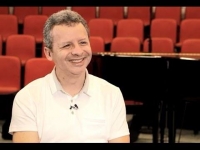
Lineu Soares in Piano from the São Judas Tadeu University (1988) and master in Music from the State University of Campinas (2012). He is currently a University Professor at the Adventist University Center of São Paulo.
Regina Spektor

Regina Spektor (born February 18, 1980) is a Soviet-born Jewish-American singer-songwriter and pianist. Her music is associated with the anti-folk scene centered on New York City's East Village.
Spektor has said that she has created 700 songs, but that she rarely writes any of them down. She has also stated that she never aspired to write songs herself, but songs seem to just flow to her. Spektor possesses a broad vocal range and uses the full extent of it. She also explores a variety of different and somewhat unorthodox vocal techniques, such as verses composed entirely of buzzing noises made with the lips and beatbox-style flourishes in the middle of ballads, and also makes use of such unusual musical techniques as using a drum stick to tap rhythms on the body of the piano or chair.
Her lyrics are equally eclectic, often taking the form of abstract narratives or first-person character studies, similar to short stories or vignettes put to song. Spektor usually sings in English, though she sometimes includes a few words or verses of Latin, Russian, French, and other languages in her songs.
Spektor has said that she has created 700 songs, but that she rarely writes any of them down. She has also stated that she never aspired to write songs herself, but songs seem to just flow to her. Spektor possesses a broad vocal range and uses the full extent of it. She also explores a variety of different and somewhat unorthodox vocal techniques, such as verses composed entirely of buzzing noises made with the lips and beatbox-style flourishes in the middle of ballads, and also makes use of such unusual musical techniques as using a drum stick to tap rhythms on the body of the piano or chair.
Her lyrics are equally eclectic, often taking the form of abstract narratives or first-person character studies, similar to short stories or vignettes put to song. Spektor usually sings in English, though she sometimes includes a few words or verses of Latin, Russian, French, and other languages in her songs.
Astor Piazzolla

Ástor Pantaleón Piazzolla (March 11, 1921 – July 4, 1992) was an Argentine tango composer and bandoneón player. His oeuvre revolutionized the traditional tango into a new style termed nuevo tango, incorporating elements from jazz and classical music. An excellent bandoneonist, he regularly performed his own compositions with different ensembles.
Piazzolla's nuevo tango was distinct from the traditional tango in its incorporation of elements of jazz, its use of extended harmonies and dissonance, its use of counterpoint, and its ventures into extended compositional forms. As Argentine psychoanalyst Carlos Kuri has pointed out, Piazzolla's fusion of tango with this wide range of other recognizable Western musical elements was so successful that it produced a new individual style transcending these influences. It is precisely this success, and individuality, that makes it hard to pin down where particular influences reside in his compositions, but some aspects are clear. The use of the passacaglia technique of a circulating bass line and harmonic sequence, invented and much used in 17th and 18th century baroque music but also central to the idea of jazz "changes", predominates in most of Piazzolla's mature compositions. Another clear reference to the baroque is the often complex and virtuosic counterpoint that sometimes follows strict fugal behavior but more often simply allows each performer in the group to assert his voice. A further technique that emphasises this sense of democracy and freedom among the musicians is improvisation that is borrowed from jazz in concept, but in practice involves a different vocabulary of scales and rhythms that stay within the parameters of the established tango sound-world. Pablo Ziegler has been particularly responsible for developing this aspect of the style both within Piazzolla's groups and since the composer's death.
Piazzolla's nuevo tango was distinct from the traditional tango in its incorporation of elements of jazz, its use of extended harmonies and dissonance, its use of counterpoint, and its ventures into extended compositional forms. As Argentine psychoanalyst Carlos Kuri has pointed out, Piazzolla's fusion of tango with this wide range of other recognizable Western musical elements was so successful that it produced a new individual style transcending these influences. It is precisely this success, and individuality, that makes it hard to pin down where particular influences reside in his compositions, but some aspects are clear. The use of the passacaglia technique of a circulating bass line and harmonic sequence, invented and much used in 17th and 18th century baroque music but also central to the idea of jazz "changes", predominates in most of Piazzolla's mature compositions. Another clear reference to the baroque is the often complex and virtuosic counterpoint that sometimes follows strict fugal behavior but more often simply allows each performer in the group to assert his voice. A further technique that emphasises this sense of democracy and freedom among the musicians is improvisation that is borrowed from jazz in concept, but in practice involves a different vocabulary of scales and rhythms that stay within the parameters of the established tango sound-world. Pablo Ziegler has been particularly responsible for developing this aspect of the style both within Piazzolla's groups and since the composer's death.
Mozart

Wolfgang Amadeus Mozart, full name Johann Chrysostom Wolfgang Amadeus Mozart (27 January 1756 â 5 December 1791) was a prolific and influential composer of the Classical era. His over 600 compositions include works widely acknowledged as pinnacles of symphonic, concertante, chamber, piano, operatic, and choral music. Mozart is among the most enduringly popular of classical composers, and many of his works are part of the standard concert repertoire.
Mozart's music, like Haydn's, stands as an archetypal example of the Classical style. His works spanned the period during which that style transformed from one exemplified by the style galant to one that began to incorporate some of the contrapuntal complexities of the late Baroque, complexities against which the galant style had been a reaction. Mozart's own stylistic development closely paralleled the development of the classical style as a whole. In addition, he was a versatile composer and wrote in almost every major genre, including symphony, opera, the solo concerto, chamber music including string quartet and string quintet, and the piano sonata. While none of these genres were new, the piano concerto was almost single-handedly developed and popularized by Mozart. He also wrote a great deal of religious music, including masses; and he composed many dances, divertimenti, serenades, and other forms of light entertainment.
The central traits of the classical style can be identified in Mozart's music. Clarity, balance, and transparency are hallmarks of his work.
Mozart's music, like Haydn's, stands as an archetypal example of the Classical style. His works spanned the period during which that style transformed from one exemplified by the style galant to one that began to incorporate some of the contrapuntal complexities of the late Baroque, complexities against which the galant style had been a reaction. Mozart's own stylistic development closely paralleled the development of the classical style as a whole. In addition, he was a versatile composer and wrote in almost every major genre, including symphony, opera, the solo concerto, chamber music including string quartet and string quintet, and the piano sonata. While none of these genres were new, the piano concerto was almost single-handedly developed and popularized by Mozart. He also wrote a great deal of religious music, including masses; and he composed many dances, divertimenti, serenades, and other forms of light entertainment.
The central traits of the classical style can be identified in Mozart's music. Clarity, balance, and transparency are hallmarks of his work.
Harry Bannink
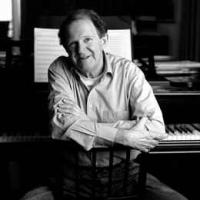
Harry Bannink was a Dutch composer, arranger and pianist. He wrote over 3,000 songs. Bannink studied at the Royal Conservatory in The Hague, receiving his degree in 1946. He started his musical career in the late fifties, when he joined a small dance-orchestra as pianist.
John Leavitt

John Leavitt is a Kansas native, born and raised in Leavenworth, Kansas. He completed doctoral work in Choral Conducting at the University of Missouri-Kansas City Conservatory of Music. His undergraduate work is in Music Education from Emporia State University.
Eduardo Hontiveros
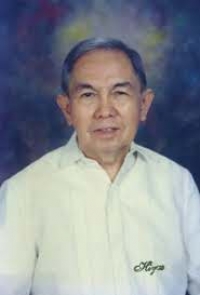
Rev Fr Eduardo Pardo Hontiveros, SJ PMM(Ph) (20 December 1923 – 15 January 2008), also known as "Fr. Honti", was a Filipino Jesuit composer and musician, best known as an innovative hymnwriter behind popular Philippine liturgical music.
Mariah Carey

Mariah Carey (born March 27, 1970) is an American singer, songwriter, record producer, and actress. She made her recording debut in 1990 under the guidance of Columbia Records executive Tommy Mottola, and became the first recording artist to have her first five singles top the U.S. Billboard Hot 100 chart. Following her marriage to Mottola in 1993, a series of hit records established her position as Columbia's highest-selling act. According to Billboard magazine, she was the most successful artist of the 1990s in the United States.
Following her separation from Mottola in 1997, Carey introduced elements of hip hop into her album work, to much initial success, but her popularity was in decline when she left Columbia in 2001, and she was dropped by Virgin Records the following year after a highly publicized physical and emotional breakdown, as well as the poor reception given to Glitter, her film and soundtrack project. In 2002, Carey signed with Island Records, and after a relatively unsuccessful period, she returned to pop music in 2005.
Carey was named the best-selling female pop artist of the millennium at the 2000 World Music Awards. She has had the most number-one singles for a solo artist in the United States (eighteen; second artist overall behind The Beatles), where, according to the Recording Industry Association of America, she is the third best-selling female and sixteenth overall recording artist. In addition to her commercial accomplishments, Carey has earned five Grammy Awards, and is well-known for her vocal range, power, melismatic style, and use of the whistle register.
Following her separation from Mottola in 1997, Carey introduced elements of hip hop into her album work, to much initial success, but her popularity was in decline when she left Columbia in 2001, and she was dropped by Virgin Records the following year after a highly publicized physical and emotional breakdown, as well as the poor reception given to Glitter, her film and soundtrack project. In 2002, Carey signed with Island Records, and after a relatively unsuccessful period, she returned to pop music in 2005.
Carey was named the best-selling female pop artist of the millennium at the 2000 World Music Awards. She has had the most number-one singles for a solo artist in the United States (eighteen; second artist overall behind The Beatles), where, according to the Recording Industry Association of America, she is the third best-selling female and sixteenth overall recording artist. In addition to her commercial accomplishments, Carey has earned five Grammy Awards, and is well-known for her vocal range, power, melismatic style, and use of the whistle register.
Beatles

The Beatles were an English rock band formed in Liverpool in 1960. Their best-known lineup, consisting of John Lennon, Paul McCartney, George Harrison, and Ringo Starr, became the greatest and most influential act of the rock era, introducing more innovations into popular music than any other rock band of the 20th century. Rooted in skiffle and 1950s rock and roll, the Beatles later utilized several genres, ranging from pop ballads to psychedelic rock, often incorporating classical elements in innovative ways. In the early 1960s, their enormous popularity first emerged as "Beatlemania", but as their songwriting grew in sophistication, they came to be perceived by many fans and cultural observers as an embodiment of the ideals shared by the era's sociocultural revolutions.
The band built their reputation playing clubs in Liverpool and Hamburg over a three-year period from 1960. Manager Brian Epstein moulded them into a professional act and producer George Martin enhanced their musical potential. They gained popularity in the United Kingdom after their first modest hit, "Love Me Do", in late 1962. They acquired the nickname the "Fab Four" as Beatlemania grew in Britain over the following year, and by early 1964 they had become international stars, leading the "British Invasion" of the United States pop market. From 1965 on, the Beatles produced what many critics consider their finest material, including the innovative and widely influential albums Rubber Soul (1965), Revolver (1966), Sgt Pepper's Lonely Hearts Club Band (1967), The Beatles (1968), and Abbey Road (1969). After their break-up in 1970, they each enjoyed successful musical careers. Lennon was shot and killed in December 1980, and Harrison died of lung cancer in November 2001. McCartney and Starr remain musically active.
The band built their reputation playing clubs in Liverpool and Hamburg over a three-year period from 1960. Manager Brian Epstein moulded them into a professional act and producer George Martin enhanced their musical potential. They gained popularity in the United Kingdom after their first modest hit, "Love Me Do", in late 1962. They acquired the nickname the "Fab Four" as Beatlemania grew in Britain over the following year, and by early 1964 they had become international stars, leading the "British Invasion" of the United States pop market. From 1965 on, the Beatles produced what many critics consider their finest material, including the innovative and widely influential albums Rubber Soul (1965), Revolver (1966), Sgt Pepper's Lonely Hearts Club Band (1967), The Beatles (1968), and Abbey Road (1969). After their break-up in 1970, they each enjoyed successful musical careers. Lennon was shot and killed in December 1980, and Harrison died of lung cancer in November 2001. McCartney and Starr remain musically active.
Elgar

Sir Edward William Elgar, 1st Baronet, OM, GCVO (2 June 1857 – 23 February 1934) was an English composer. He is known for such works as the Enigma Variations, the Pomp and Circumstance Marches, The Dream of Gerontius, concertos for violin and cello, and two symphonies. He also composed oratorios, chamber music and songs. He was appointed Master of the King's Musick in 1924.
Puccini

Giacomo Antonio Domenico Michele Secondo Maria Puccini (December 22, 1858 – November 29, 1924) was an Italian composer whose operas, including La Bohème, Tosca, and Madama Butterfly, are among the most frequently performed in the standard repertoire. Some of his arias, such as "O Mio Babbino Caro" from Gianni Schicchi, "Che gelida manina" from La Bohème, and "Nessun Dorma" from Turandot, have become part of popular culture.
The subject of Puccini's style is one that has been long avoided by musicologists; this avoidance can perhaps be attributed to the perception that his work, with its emphasis on melody and evident popular appeal, lacked "seriousness" (a similar prejudice beset Rachmaninoff during his lifetime). Despite the place Puccini clearly occupies in the popular tradition of Verdi, his style of orchestration also shows the strong influence of Wagner, matching specific orchestral configurations and timbres to different dramatic moments. His operas contain an unparalleled manipulation of orchestral colors, with the orchestra often creating the scene’s atmosphere.
The structures of Puccini's works are also noteworthy. While it is to an extent possible to divide his operas into arias or numbers (like Verdi's), his scores generally present a very strong sense of continuous flow and connectivity, perhaps another sign of Wagner’s influence. Like Wagner, Puccini used leitmotifs to connote characters (or combinations of characters). This is apparent in Tosca, where the three chords which signal the beginning of the opera are used throughout to announce Scarpia. Several motifs are also linked to Mimi and the Bohemians in La Bohème and to Cio-Cio-San's eventual suicide in Butterfly. Unlike Wagner, though, Puccini's motifs are static: where Wagner's motifs develop into more complicated figures as the characters develop, Puccini's remain more or less identical throughout the opera (in this respect anticipating the themes of modern musical theatre).
The subject of Puccini's style is one that has been long avoided by musicologists; this avoidance can perhaps be attributed to the perception that his work, with its emphasis on melody and evident popular appeal, lacked "seriousness" (a similar prejudice beset Rachmaninoff during his lifetime). Despite the place Puccini clearly occupies in the popular tradition of Verdi, his style of orchestration also shows the strong influence of Wagner, matching specific orchestral configurations and timbres to different dramatic moments. His operas contain an unparalleled manipulation of orchestral colors, with the orchestra often creating the scene’s atmosphere.
The structures of Puccini's works are also noteworthy. While it is to an extent possible to divide his operas into arias or numbers (like Verdi's), his scores generally present a very strong sense of continuous flow and connectivity, perhaps another sign of Wagner’s influence. Like Wagner, Puccini used leitmotifs to connote characters (or combinations of characters). This is apparent in Tosca, where the three chords which signal the beginning of the opera are used throughout to announce Scarpia. Several motifs are also linked to Mimi and the Bohemians in La Bohème and to Cio-Cio-San's eventual suicide in Butterfly. Unlike Wagner, though, Puccini's motifs are static: where Wagner's motifs develop into more complicated figures as the characters develop, Puccini's remain more or less identical throughout the opera (in this respect anticipating the themes of modern musical theatre).
Charlie Christian
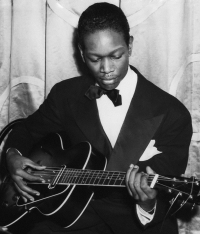
Charles Henry Christian (July 29, 1916 – March 2, 1942) was an American swing and jazz guitarist.Christian was an important early performer on the electric guitar and a key figure in the development of bebop and cool jazz. He gained national exposure as a member of the Benny Goodman Sextet and Orchestra from August 1939 to June 1941. His single-string technique, combined with amplification, helped bring the guitar out of the rhythm section and into the forefront as a solo instrument. For this, he is often credited with leading to the development of the lead guitar role in musical ensembles and bands.
Mitch Kerper
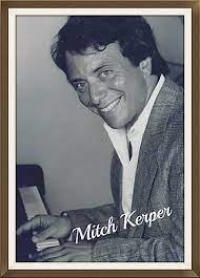
For over 30 years, Mitch Kerper (A graduate of New York University and the New York College of Music), experienced profound success as a professional Jazz pianist, composer, Broadway conductor, arranger, and author.The scope of his accomplishments have been extensive, providing him the opportunity to both compose and perform music in domestic and international venues
Jeremiah Clarke
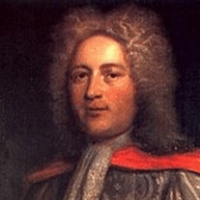
Jeremiah Clarke (c. 1674 – 1 December 1707) was an English baroque composer and organist, best known for his Trumpet Voluntary, a popular piece often played at wedding ceremonies.The exact date of Clarke's birth has been debated. The Dictionary of National Biography states that Clarke "is said to have been born in 1669 (though probably the date should be earlier)." Most sources say that he is thought to have been born in London around 1674.Clarke was one of the pupils of John Blow at St Paul's Cathedral and a chorister in 1685 at the Chapel Royal. Between 1692 and 1695 he was an organist at Winchester College, then between 1699 and 1704 he was an organist at St Paul's Cathedral. He later became an organist and 'Gentleman extraordinary' at the Chapel Royal, he shared that post with fellow composer William Croft, his friend. They were succeeded by John Blow.
Aram Khachaturian
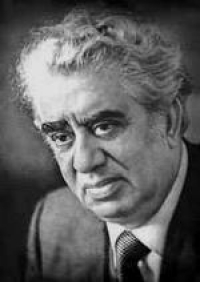
Aram Ilyich Khachaturian (Armenian: Արամ Խաչատրյան; Russian: Ара́м Ильи́ч Хачатуря́н; June 6 1903 – May 1, 1978) was a prominent Soviet Armenian composer. Khachaturian's works were often influenced by classical Russian music and Armenian folk music. He is most famous for the Adagio of Spartacus and Phrygia from his ballet Spartacus, and for the "Sabre Dance" from his ballet Gayane and the adagio from the same ballet, much used in films since its first use in Stanley Kubrick's 2001: A Space Odyssey.
Salamoni Rossi
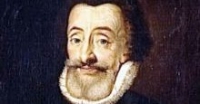
Salamone Rossi or Salomone Rossi was an Italian Jewish violinist and composer. He was a transitional figure between the late Italian Renaissance period and early Baroque.
Riz Ortolani
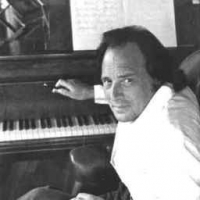
Riziero "Riz" Ortolani was an Italian film composer. Ortolani scored over 200 films, working mostly within the Italian genres of Mondo, Giallo, and the Spaghetti Western. Ortolani also scored many Hollywood films and has had some of his compositions reused in films like Drive and Django Unchained.
Franz Lehar
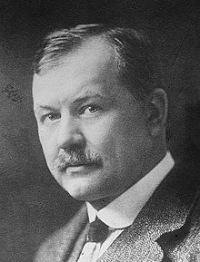
Franz Lehár (30 April 1870 – 24 October 1948) was an Austrian composer. He is mainly known for his operettas of which the most successful and best known is The Merry Widow (Die lustige Witwe).
 Sheet Music Mobile is a site for those who wants to access popular sheet music easily,
letting them download the sheet music for free for trial purposes.
It's completely free to download and try the listed sheet music, but you have to delete the files after 24 hours of trial.
Don't forget, if you like the piece of music you have just learned playing,
treat the artist with respect, and go buy the original sheet music.
Sheet Music Mobile is a site for those who wants to access popular sheet music easily,
letting them download the sheet music for free for trial purposes.
It's completely free to download and try the listed sheet music, but you have to delete the files after 24 hours of trial.
Don't forget, if you like the piece of music you have just learned playing,
treat the artist with respect, and go buy the original sheet music.
